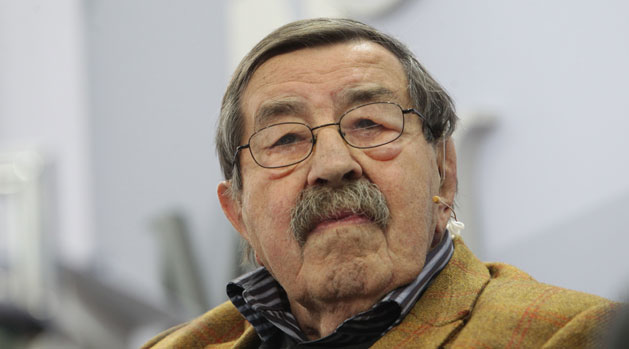Günter Grass dies: Salman Rushdie leads tributes to 'a true giant'
The acclaimed author of the Tin Drum and a figure of 'enduring controversy' has passed away aged 87

A free daily email with the biggest news stories of the day – and the best features from TheWeek.com
You are now subscribed
Your newsletter sign-up was successful
Günter Grass, Germany’s Nobel Prize-winning author of The Tin Drum, has died in hospital aged 87.
Friend and fellow writer Salman Rushdie led the tributes, tweeting: "This is very sad. A true giant, inspiration, and friend. Drum for him, little Oskar."
Translator Anthea Bell said he was "a literary figure of the most enormous stature in post-war German letters, and throughout the world”.
The Week
Escape your echo chamber. Get the facts behind the news, plus analysis from multiple perspectives.

Sign up for The Week's Free Newsletters
From our morning news briefing to a weekly Good News Newsletter, get the best of The Week delivered directly to your inbox.
From our morning news briefing to a weekly Good News Newsletter, get the best of The Week delivered directly to your inbox.
Grass was awarded the Nobel Prize for literature in 1999 for The Tin Drum, which became a post-Second World War classic and was adapted into an Oscar- and Palme d’Or-winning film. The Nobel committee said it was as if German literature had been granted "a new beginning after decades of linguistic and moral destruction".
Much of his work focused on the Nazi era, the horrors of the war and German guilt, with The Guardian describing him as a "figure of enduring controversy". Grass was born in 1927 to Polish-German parents and was conscripted into the army when he was 17 years old.
He served in the Waffen-SS and spent months in an American prisoner-of-war camp. There were calls for him to return his Nobel Prize after he admitted to serving in the SS during an interview with the Frankfurter Allgemeine Zeitung in 2006.
Rushdie has defended his friend on numerous occasions – including when he was banned from going to Israel because of a controversial poem. "If you were a teenager and a Nazi came to conscript you, and a refusal meant death, would you choose to die? ... To be a conscript is not [to] be a Nazi," he said according to The Daily Telegraph.
A free daily email with the biggest news stories of the day – and the best features from TheWeek.com
A novelist, poet, drummer and sculptor, Grass was often described as "Germany's conscience". He campaigned for peace and the environment and was a vocal critic of German reunification, which he compared to Hitler’s “annexation” of Austria.
His greatest achievement is that "he managed to make his contribution to debate, however angry, with a quiet smile and twinkle in his hooded eyes," The Observer's Tim Adams wrote in 2002.
"He is a jazz lover, a family man, a generous host (these days offering guests several slugs of his own label 'Nobel' grappa). And of posterity he says only: 'I hope people are still able to laugh when they are reading my books.'"
-
 Quiz of The Week: 14 – 20 February
Quiz of The Week: 14 – 20 FebruaryQuiz Have you been paying attention to The Week’s news?
-
 The Week Unwrapped: Do the Freemasons have too much sway in the police force?
The Week Unwrapped: Do the Freemasons have too much sway in the police force?Podcast Plus, what does the growing popularity of prediction markets mean for the future? And why are UK film and TV workers struggling?
-
 Properties of the week: pretty thatched cottages
Properties of the week: pretty thatched cottagesThe Week Recommends Featuring homes in West Sussex, Dorset and Suffolk
-
 Epstein files topple law CEO, roil UK government
Epstein files topple law CEO, roil UK governmentSpeed Read Peter Mandelson, Britain’s former ambassador to the US, is caught up in the scandal
-
 Iran and US prepare to meet after skirmishes
Iran and US prepare to meet after skirmishesSpeed Read The incident comes amid heightened tensions in the Middle East
-
 Israel retrieves final hostage’s body from Gaza
Israel retrieves final hostage’s body from GazaSpeed Read The 24-year-old police officer was killed during the initial Hamas attack
-
 China’s Xi targets top general in growing purge
China’s Xi targets top general in growing purgeSpeed Read Zhang Youxia is being investigated over ‘grave violations’ of the law
-
 Panama and Canada are negotiating over a crucial copper mine
Panama and Canada are negotiating over a crucial copper mineIn the Spotlight Panama is set to make a final decision on the mine this summer
-
 Why Greenland’s natural resources are nearly impossible to mine
Why Greenland’s natural resources are nearly impossible to mineThe Explainer The country’s natural landscape makes the task extremely difficult
-
 Iran cuts internet as protests escalate
Iran cuts internet as protests escalateSpeed Reada Government buildings across the country have been set on fire
-
 US nabs ‘shadow’ tanker claimed by Russia
US nabs ‘shadow’ tanker claimed by RussiaSpeed Read The ship was one of two vessels seized by the US military